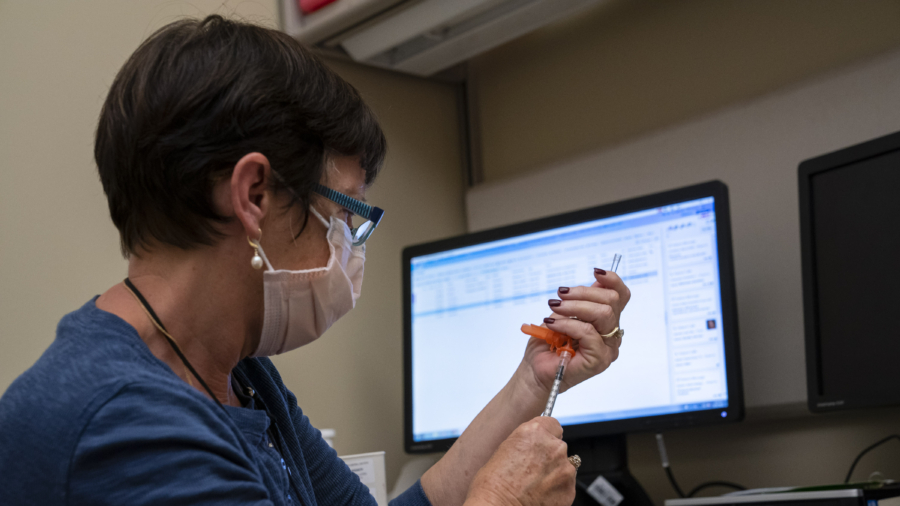The updated COVID-19 vaccine boosters are effective against hospitalization, at least for a short period of time, according to two new studies from the U.S. Centers for Disease Control and Prevention (CDC).
The Pfizer and Moderna bivalent boosters were estimated to be 57 percent effective against COVID-19-associated hospitalizations among adults without certain serious health conditions, according to one of the papers.
Researchers with the CDC and other institutions analyzed data from the VISION Network, a CDC-run system that includes nine healthcare sites. The system had records from 15,527 hospitalizations from Sept. 13 to Nov. 18.
Researchers said the data show a bivalent dose seven days or more after administration was 57 percent effective against hospitalization when compared to the unvaccinated. They did not stratify by prior infection, which produces shielding that has consistently been superior to vaccination. Researchers also estimated that effectiveness against hospitalization was improved by 38 percent to 45 percent for those who received the old vaccine as at least a primary series.
“In this early study of immunocompetent adults, significant protection from a booster dose of bivalent mRNA COVID-19 vaccine (after receipt of 2, 3, or 4 monovalent doses) compared with no vaccination was found, as well as significant relative benefits of a bivalent booster dose when compared with previous receipt of monovalent doses only. These findings support efforts to improve coverage with bivalent vaccines, although optimal timing for receipt of bivalent vaccine booster doses needs to be established,” the researchers said.
The paper was published on Dec. 16 by the CDC’s quasi-journal, the Morbidity and Mortality Weekly Report (MMWR). The journal “constitutes the official voice” of the CDC, the agency has acknowledged (pdf). Additionally, most articles are not peer-reviewed but are shaped by top agency officials. “By the time a report appears in MMWR, it reflects, or is consistent with, CDC policy,” the agency says.
The CDC policy during the pandemic has been to aggressively promote COVID-19 vaccinations.
Limitations of the new study include it being retrospective.
Federal officials often promote randomized controlled trials as the gold standard but there is still no data on the boosters from any such trials, even months after they were authorized and recommended in the fall with only data from mice experiments. Neither Pfizer’s nor Moderna’s trials have produced results yet. The authorizations were for the prevention of COVID-19, but the boosters provide subpar shielding against symptomatic infection, according to an earlier CDC study.
Second Paper
Another paper published by the CDC this week, drawing from a separate CDC-run system called the IVY Network, estimated that the new boosters provided 84 percent protection against hospitalizations associated with COVID-19.
Researchers for that study analyzed data from so-called immunocompetent adults aged 65 and older—leaving out immunocompromised patients—from Sept. 8 to Nov. 30.
Seven days or more after the administration of one of the new shots, the protection against hospitalization was estimated to be 84 percent versus the unvaccinated and 73 percent to 83 percent for people who had received at least a primary series of the old vaccines.
The new shots are based on both the original Wuhan virus strain and a common sublineage of the newer BA.4/BA.5 strains, both of which are subvariants of the Omicron variant. The new shots are only available as boosters for most of the population. The old vaccines are currently the only vaccines available as an initial regimen, or a primary series.
Researchers said the study showed that a “recent bivalent booster vaccination offers substantial added protection against COVID-19 hospitalization.”
“All eligible persons, especially adults aged ≥65 years, should receive a bivalent booster dose to maximize protection against COVID-19 hospitalization this winter season,” they added.
Neither paper measured effectiveness against infection or effectiveness at all for children.
Pfizer and Moderna did not respond to requests for comment.
Criticism
Dr. Vinay Prasad, an epidemiology professor at the University of California, San Francisco, was among the critics of the new papers.
Prasad said that excluding people who received a Johnson & Johnson vaccine and people who experienced symptoms within seven days of receiving a new booster tainted the results.
“If I get a bivalent booster and get sick tomorrow, that should count against getting a bivalent booster. Yet it won’t. The CDC’s method is baking in immortal time,” Prasad said in a blog post.
The professor also wondered why people who tested positive for influenza were excluded, which researchers said was due to a “potential correlation between COVID-19 and influenza vaccination behaviors.”
“This is absolutely horrific. There is no justification on planet earth for this, and it strongly makes one suspect that the original analysis, which included these people, was null or unimpressive,” Prasad said, adding later, “In my opinion, the CDC is no longer a scientific agency, they are a[n] arm of political propaganda and this study fits the bill.”
New Variants
Other experts have expressed concerns about how the new boosters will perform against variants that have been displacing BA.4 and BA.5.
According to projections by the CDC, BQ.1.1 and BQ.1 were responsible for more than 68 percent of the COVID-19 cases in the United States in the week ending on Dec. 17. BA.4 was entirely displaced while BA.5, once dominant, was down to 10 percent.
In a study published by Cell on Dec. 13 (pdf), U.S. researchers found that BQ.1, BQ.1.1, and two other newer variants were “the most resistant” variants to date.
The laboratory testing the researchers performed showed that “these new subvariants were barely susceptible to neutralization by sera from vaccinated individuals with or without prior infection, including persons recently boosted with the new bivalent mRNA vaccines.”
From The Epoch Times


